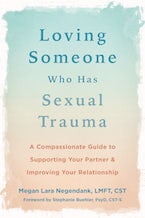By Megan Lara Negendank, LMFT, CST, author of Loving Someone Who Has Sexual Trauma
A new client comes into my office. They have reached out to me for therapy because they are working through the sexual assault that happened to them a few years back. While the nightmares have faded and they are no longer experiencing the high levels of stress that followed in that first couple years of healing, they still get triggered.
They are frustrated with themselves. They thought they had healed, but they are one year into a new relationship with a great partner—and their trauma symptoms keep popping up seemingly out of nowhere. During intimacy, when otherwise the night had gone great, and during important conversations. They feel too sensitive and are worried they are sabotaging their relationship.
“Do you think we could bring in my partner for a few of the sessions?” they ask. “They have some questions about why this is happening and I know they are in a lot of pain, too.”
This is not an uncommon scenario at my therapy center, Love Heal Grow. Since our practice specializes in relationships, sex, and trauma, we support hundreds of individuals and partners a week who are experiencing great pain and frustration because trauma from outside of their relationship is wreaking havoc on their day-to-day connection. Sex, communication, conflict, everyday closeness—they wonder if these normal relationship moments will ever be without fear, arguments, shutdowns, and confusion.
Partners of sexual trauma survivors are very special people in the survivors’ life. They have been deemed safe enough to get close to, and they often have many great qualities that contribute to strong relationship foundations. They also (unfortunately) are best set up to trigger their partner since survivors often are triggered during intimacy or during relational conflict.
This can be so confusing! How can the safest person in the survivor’s life also be the one seemingly causing the survivor the most pain? It doesn’t feel fair.
But, when we think of sexual trauma as a relational betrayal—which impacts our sense of safety and our ability to form secure attachments to others—it actually makes a lot of sense. The survivor has had their sense of relational safety ripped away from them. And when their partner gets close, this can feel scary and disorienting.
Confused partners want to support their loved one, they want to understand what is going on, and they want the tools to help their partner heal—so they both can experience a happy relationship with pleasurable connection.
If this is you, the first step to finding a way back to each other is trying to have conversations about the survivor’s triggers and what they need when they come up.
The following are reflection and discussion prompts you can use. If you two are discussing this together, you may notice that talking through these prompts builds more understanding and connection. Your partner may only be able to discuss one or two prompts at a time; support them in any boundaries they set. And if your partner isn’t ready to have these discussions, you can self-reflect on your own experiences and observations of your partner.
· Do you know some of your triggers, and are there any you want to share with me?
· Is there anything I do that triggers you? What is it like for you when that happens?
· Do you identify with any of the trauma responses (fight-flight-freeze-fawn)? What is it like for you when you go into your trauma response?
· How does it feel in your body when you are triggered?
· What urges do you have when you are triggered?
· What thoughts do you have when you are triggered?
· What feelings do you have when you are triggered?
· What kind of support do you need from me when you are triggered into a trauma response?
When you know about your partner’s triggers and their trauma response, you can get better at supporting them. When your partner is in fight, flight, freeze, or fawn mode, it might be hard for them to connect with you authentically and you may become triggered yourself.
You and your partner deserve relational and sexual wellness. Together, you can use these prompts to learn more about how to get unstuck in moments of disconnection and distress.
Megan Lara Negendank, LMFT, CST, is a licensed marriage and family therapist, and a certified sex therapist. She is founder of Love Heal Grow, a psychotherapy center in Northern California where she specializes in trauma-informed, relationship-focused psychotherapy for survivors of trauma and their partners. She has been featured as a relationship expert on PBS, NPR, and in Sacramento Magazine.



 2024 Peace Playbook: 3 Tactics to Avoid Clashes with Your Partner
2024 Peace Playbook: 3 Tactics to Avoid Clashes with Your Partner